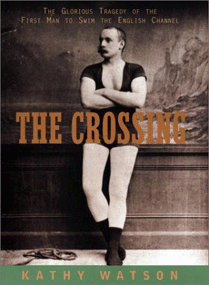Matthew Webb (Born
1848)
Matthew Webb was born at
Dawley, Shropshire on 19th January 1848. Webb was one of 12 children of
Thomas Webb and Sarah Cartwright. Thomas Webb was a Doctor and the family
moved to Coalbrookdale after Matthews birth.
Matthew learned to swim as a boy in the River
Severn and served a 3 year apprenticeship as a seaman with Rathbone Bros. of
Liverpool. He joined the merchant marine, where he became a national hero
after diving into the sea mid-Atlantic to rescue a man overboard whilst
second mate on Cunard's ‘Russia’, travelling New York to Liverpool.
He married Madelaine Kate Chaddock in
London on 27 April 1880. They had two children, Matthew Jnr. and Helen.
|
 |
A natural showman, he gained sponsors for what
was considered an impossible feat, to swim from Dover to Calais. In a time when
endurance exploits were prized higher than races against time, the supreme test
was the English Channel -- the Channel was considered impossible to swim. On
August 24, 1875, Captain Matthew Webb slipped into the water at Dover, England,
and 21 hours and 45 minutes later touched land at Cape Gris Nez, France,
becoming the first man to conquer the English Channel. Relying mainly on the
breaststroke, he swam some 38 miles in covering a straightline distance of about
20 miles. On his swim he was accompanied by the Dover lugger ‘Ann’ piloted by
George Toms and crewed by Dodd, Bowles, Jell, Gates, Decent and Stanley. Also on
board were Webb's cousin G.H. Ward, Charles Baker the diver and pacemaker, and
local journalists Bavington Jones, Warman, Payne and Wilkinson (also
representing nationals) plus Bell, an artist for the Illustrated London News. It
wasn't an uneventful trip. Along the way, Captain Webb sang, sipped coffee and
beer, ate steaks, was stung by a jellyfish and had to fight his way through a
nasty storm. After the physical agony of Webb's crossing he returned
triumphantly sailing into Dover to the wild applause of crowds jammed on the
pier. His exploit made Webb famous and gave the new sport of swimming an
enormous boost. Newspapers described him as "probably the best-known and most
popular man in the world" and his achievement "a matter of national importance."
As his fame faded, however, Webb tried to keep
himself in the public eye with a series of dubious public appearances, such as
spending 60 hours in a glass tank at the Royal Westminster Aquarium, exploits
that gradually ruined his health. Finally, for $10,000 he attempted to swim
across the Niagara rapids and was crushed in the whirlpool below the falls.

